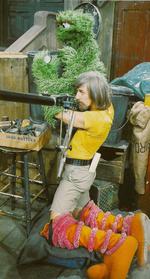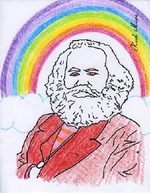I was watching the classic footage again last night, where Fred Rogers testified before the Senate and powerfully defended public television and won over the steely hearts of the politicians by, well, by just him being him. As Graham said on We Love You So,
Mister Rogers' Neighborhood had been on the air for less than two years when PBS and the Corporation for Public Broadcasting became a target of massive budget cuts proposed by Richard Nixon, who hoped to funnel that money into the Vietnam War. Two days into a dismal Senate subcommittee hearing that would determine the fate of PBS, Fred Rogers took the floor and addressed the chilly and impatient subcommittee chairman, John O. Pastore, with the goal of underscoring the importance of educational, emotionally positive programming for children. What happens next is straight out of a Frank Capra film.And then I wondered, was that really how it went down? I don't think it takes away from Mr. Rogers' trip to Washington to know that things were a bit more complicated than they appeared in this clip.
For starters, the guy he won over, the gruff old senator who got "goose bumps" from Rogers' reciting his song lyrics, was not an opponent; he was already a fan. Pastore was a Democrat from Rhode Island who orchestrated the hearings as a way to restore the funding Nixon wanted to cut. Pastore had spoken at the 1964 DNC convention that nominated LBJ, who originally created the Corporation for Public Broadcasting in 1967. The $20 million CPB number was a one-year bump proposed by LBJ, and was actually criticized by public television producers who had been expecting a long-promised, long-term funding solution for CPB.
Rogers testified on May 1, 1969, just months after Nixon had taken office. On May 2nd, the Washington Post ran a small article on Pastore's hearings:
[He] warned yesterday any serious lag in development of educational television could mean the "death knell" for public broadcasting. Pastore, chairman of a Senate communications subcommittee, renewed his call for full financing of the program. President Nixon slashed the proposed fund for fiscal 1970 from $20 million to $10 million.Rogers wasn't mentioned in the article, though the Post did do a large, "MisteRogers" [sic] feature a couple of months later that opened with the president of the CPB testifying at the Senate hearing that "the most popular program in all non-commercial TV is 'Mister Roger's [sic] Neighborhood."
It wasn't necessarily targeted in Nixon's budget, which called for over $5 billion in domestic and military spending cuts, but public television was not uncontroversial, either. The CPB had been created as a more palatable alternative to the National Educational Television network, which had been criticized by conservatives for being too liberal. NET was still producing Mister Rogers' show in 1969, so his presence at the hearing could have struck some political undertones.
Apparently not too many. By 1970, NET was successfully replaced by PBS; Sesame Street was a massive, unassailable, educational hit; and Mister Rogers was chairing the Child Development and The Mass Media Forum at the White House Conference on Children. More on that in a minute.
As for CPB and PBS, I still haven't found out exactly what happened in the 1970 budget, except that Congress still hadn't passed it in October, four months after the fiscal year had already started. There's no source, but Pastore's Wikipedia page says that after Rogers' testimony, "The following congressional appropriation, for 1971, increased PBS funding from $9 million to $22 million." Which is apples, oranges, and pears, all at once.
Nixon had proposed $10 million for the CPB in 1970. Does that $9 million budget number mean they got even less? Or does it mean that Congressional paralysis meant that 1969 CPB budget levels were carried over for 1970, too? And that figure was $9 million? So what LBJ had proposed on his way out the door was a 120% funding jump, but Nixon only offered 10%? And yet Pastore and his Senate colleagues couldn't even deliver that until a year later? And does the creation of PBS muddy the waters even further, because it was just one more public television mouth to feed? Either way, I'm not seeing how Mister Rogers' speech, in itself, accomplished anything at all.




I don't know about that, but yay for Rick Sebak, Fred Rogers, and wqed!